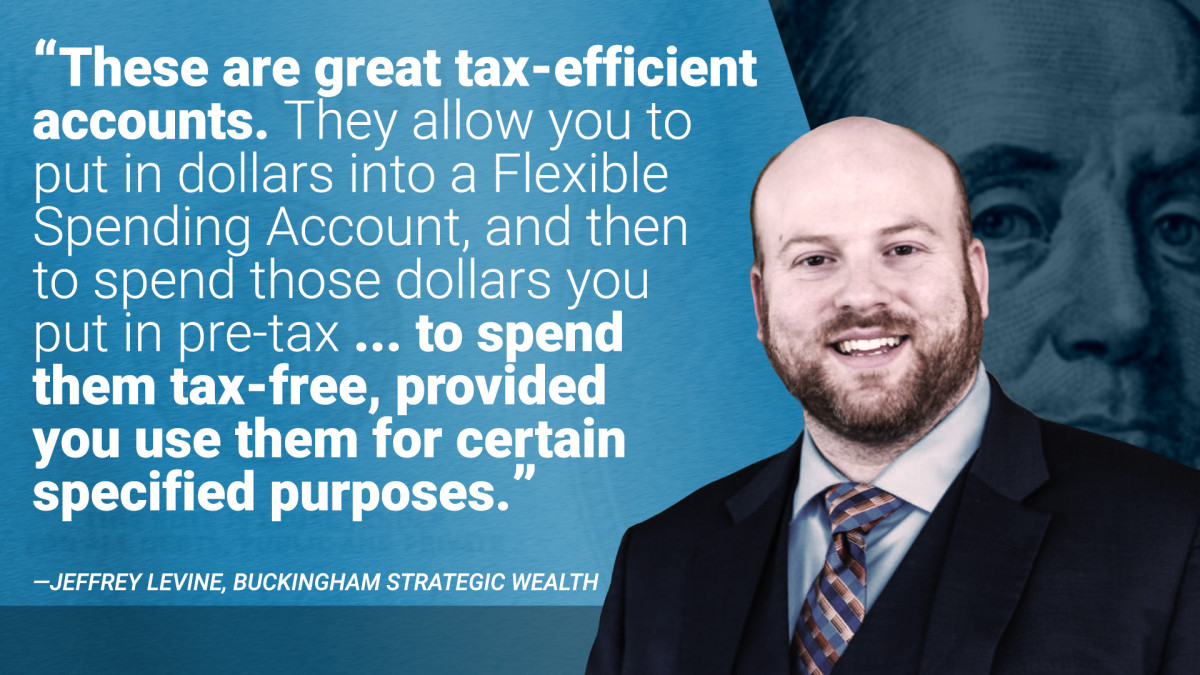What are flexible spending accounts? And what do I need to know about them regarding my taxes?
Retirement Daily’s Robert Powell caught up with Jeffrey Levine, CPA and tax pro from Buckingham Strategic Wealth Partners, to answer the question.
TurboTax Live experts look out for you. Expert help your way: get help as you go, or hand your taxes off. You can talk live to tax experts online for unlimited answers and advice OR, have a dedicated tax expert do your taxes for you, so you can be confident in your tax return. Enjoy up to an additional $20 off when you get started with TurboTax Live.
Quotes| Flexible Spending Accounts Explained Jeffrey Levine, Chief Planning Officer, Buckingham Strategic Wealth Jeffrey Levine, Chief Planning Officer, Buckingham Strategic WealthRecommended Read: Are Medical Expenses Tax Deductible?
Video Transcript| Jeffrey Levine, CPA and Tax Expert, Buckingham Strategic WealthRobert Powell: What do you need to know about flexible spending accounts? Well, here to talk taxes with us is Jeffrey Levine from Buckingham Wealth Partners. Jeffrey, what’s up with FSAs?
Jeffrey Levine: Well, I think at a high level, we need to know that these are great tax-efficient accounts. They allow you to put in dollars into a Flexible Spending Account, and then to spend those dollars you put in pre-tax, in other words with a deduction, to spend them tax-free, provided you use them for certain specified purposes.
And that actually leads us to our second key point of FSAs, and that there are more than one type of FSA. For instance, there are dependent care FSAs that can help you pay for things like child care for your young children. There are also health care FSAs that can help you pay for medical expenses. In fact, there are even different types of medical FSAs. There’s a general FSA that can be used for individuals without an HSA, and then a “limited purpose” flexible spending account for health purposes, if you do have the HSA where you’re a little bit more limited in terms of what those dollars can be used for. Oftentimes it’s dental or vision, but it’s not your traditional qualified medical expenses that a regular “FSA” could offer.
Robert Powell: Right and typically, you either have to use it or lose it in a given year?
Jeffrey Levine: So there are different rules for different sorts of accounts. And also employers can have a say in what the actual rules are. The good news here is that on the medical side, it is a lot softer than it was a few years ago. It used to be that there was a hard use it or lose it policy. Now employers can allow you to carry forward a certain amount within the plan, up to $550 right now. But that may be inflated over time. It used to be $500, and that is the general rule.
Now, recently, because of some changes due to the coronavirus pandemic, there were some additional flexibility allowed for individuals to carry forward dollars from future years, effectively unlimited amounts. But those changes are going to be sunsetting here in the near future, and we will go back to a use it or lose it, or a close to use it or lose it, with that small carryover provided each year. So if you know you’re going to potentially lose some of those dollars, whether it means getting back to $0 or getting back to, let’s say, $500 in your account, spend whatever you would lose before the end of the year on whatever you can possibly spend it on. Because otherwise it’s gone from your account and you don’t get anything back.
Editor’s Note: The content was reviewed for tax accuracy by a TurboTax CPA expert.
Zach Faulds contributed to the writing of this article and produced the video and/or the graphics associated with it.
